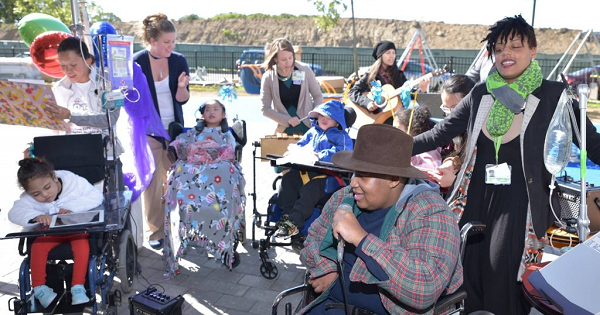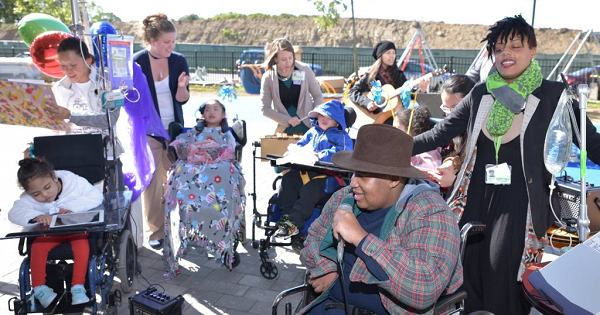Elizabeth Seton Pediatric Center – An Example of Systems Thinking

In “Elizabeth Seton Pediatric Center – example-of-systems-thinking” Carol De Angelo, Sister of Charity of NY, reflects on the systemic collaboration that led to a playground where medically fragile children can experience play and fun. She also invites us to recognize that relationships and presence to another, education, and resource building part of systemic change.
Excerpts for your consideration…
Many things moved me at the Blessing and dedication of the Paul Edward Verni Playground. The children’s choir with Josh enthusiastically singing at the mike; the children, with the assistance of their therapists, waving colorful cloths in rhythm with the music; Yvanna tapping her hands on a drum; Mary and Vito Verni sharing their son, Paul’s 19 year life story; and hearing that Shelley Mayer, other legislators, and corporations worked with Pat Tursi, CEO, to make sure that there is a place like Elizabeth Seton Pediatric Center with a playground for medically fragile children to experience play and fun.
But the image and words ingrained in me that speak to systemic change and systems thinking are: the smile on Yvanna’s face and Pat Tursi’s remark that it was the staff’s vision and call to meet the children’s needs that seeded the idea of this playground. “What about a playground for the children? The children need to play like other children. The children first.” The staff saw and listened to the children. Pat saw and listened to the staff and the children. The Verni family, legislators, public officials, corporations, Sponsor and Board heard the children through the staff. Change happened. A new playground is here. Children are delighting in it! Isn’t this systemic change and systems thinking at its best?
When I see and experience this love in action, I think of the ministries sponsored by Sisters of Charity of New York that practice systems thinking. Board members, Presidents and CEOs, Administrators and Staff often say to me, “We are about direct service, not systemic change.” And, I often flounder in expressing how the Sisters of Charity of New York sponsored works are about putting love in action through systemic change. Love and systems thinking are not often equated. The charism of charity that sponsored ministries are being asked to bring into the future is not often understood as “Civic and Political Love,” so eloquently explained by Pope Francis in Laudato Si’: On Care For Our Common Home.
The Vincentian Family, of which we are a part, sees systemic change as integral to who we are. In 2017 we celebrate the 400th Anniversary of the Charism of Charity and the 200th Anniversary of the Sisters of Charity being in New York. Since our very beginnings, we (the Sisters and their colleagues) accompanied children, families, people in need who were vulnerable, creating opportunities so that their voices, stories and needs could be heard and addressed. We continue to do this today. In collaboration with so many (such as Boards, Associates, Public Officials, Legislators, friends and family), we are about systems thinking in all its various aspects. No one person, no one situation addresses it all but together we are about creating and re-creating just systems, policies, structures, organizations and ministries that foster respect, integrity, compassion and excellence.
At Elizabeth Seton Pediatric Center, I see people who care and who form relationships with people. I see people who offer respect, dignity, support, resources and new pathways to those they serve. Aren’t relationships and presence to another, education, and resource building part of systemic change? Helping another to advocate for her/him(self) or their family is about systemic change. Board members and Management who exercise their judiciary responsibilities to ensure excellent respectful compassionate care is to keep the system (the institution or organization) integral and whole and prevent a closed and broken system. Systemic change happens in many ways. First and foremost, we need to be aware of the system we are part of and how that system is part of a larger whole. This is the hope, goal, and I would say the mission of the Sisters of Charity of New York – this is love in action.
I am sure she would welcome your thoughts.
Full text Elizabeth Seton Pediatric Center – example-of-systems-thinking
See also photos from their Facebook page.










Thank you for your clear description of how systemic thinking and compassionate care are compatible. I am proud to be related to you, the Sisters of Charity of New York.